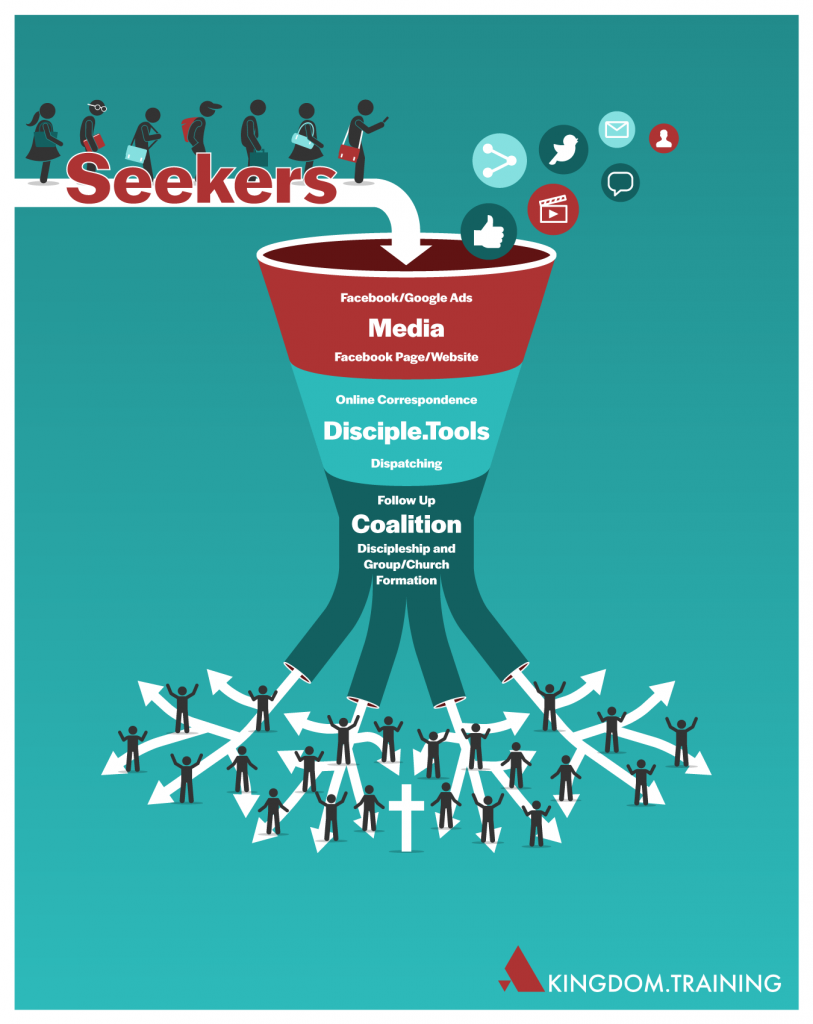
How would you feel if you went for an annual checkup and your doctor threw you a medical textbook and said, “you got this!” Most people would feel terrified in such a situation, and they wouldn’t want a seeker to feel that way in a Discovery Bible Study (DBS). That’s why it’s a common assumption that a disciple maker—as an expert—should be present for as much of the DBS as possible. Yet, around the world, most leaders of disciple making movements are reporting that the less DBS meetings a disciple maker attends the better.
To get to the bottom of this discrepancy, we are going to catalogue X aspects of a DBS group and see how a disciple maker compares to a seeker, when filling the role of the group facilitator. These aspects are as follows:
- How each person may be perceived by members of the group
- How each person may feel facilitating the group
- How each person may impact the flow of the group
- How each person might impact the reproducibility of the group
- Potential pitfalls of each type of person as a DBS facilitator
After detailing each of these functions of a DBS, we will have a definitive answer about who makes a better group facilitator. Be sure to read to the end to get a good idea of how to organize your next DBS meetings!
Overview
Many disciple makers—especially in cross-cultural settings—report a common complaint when starting a new DBS group. The group tells them one thing, but behaves differently. This is because it’s hard to discern group dynamics as an outsider. Many times, people feel compelled to say “yes” to a guest just to be hospitable. But, in actuality, the group may prefer to answer with a “no.” That’s why it’s important to break down each of the following aspects of group dynamics when trying to decide if a disciple maker or a seeker should facilitate a DBS.
Perception by Group Members
Many times, when an outsider attends a group, it throws off the social dynamics. Because of this, many disciple makers may have a hard time getting the group to participate, while a seeker who is already part of the group will have their trust. So, if you want members of the group to feel comfortable sharing openly, it’s definitely better to have a seeker facilitating the group.
Ability of the Facilitator
To be sure, a seeker may feel overwhelmed being told to facilitate a DBS without an outside disciple maker present. Especially considering the training and practice a disciple maker might have. However, don’t assume this is a bad thing! On the contrary, this may drive the facilitator to rely on the others in the group. In short, a facilitator with low skill and high relationship produces an engaged group, while a facilitator with high skill and low relationship produces a quiet and unresponsive group. Another point for the seeker.
Group Flow
There’s no getting around the fact that most disciple makers will have some training or experience in DBS facilitation. Even if not, as a believer, they have the Holy Spirit inside of them to help them run the DBS smoothly. In this category, a disciple maker may be a better facilitator than a seeker. This can be overcome with a bit of coaching, so be sure to check out our other article on the subject.
Reproducibility
Remember when we said the group may be more comfortable and open with a seeker facilitating it? Well, when it comes time to decide on an “I will” statement, or determine who they can share with, they will be more likely to give an honest answer to a fellow seeker. A disciple maker may face the common struggle of people not doing what they said they’d do, and for that reason, a DBS facilitated by a seeker may be more likely to reproduce.
Potential Pitfalls
As we mentioned earlier, since a seeker is by definition not a believer, they may face a number of pitfalls. Perhaps they are unfamiliar with the Bible, for example. A disciple maker, on the other hand might find themselves talking too much, since most believers are used to attending churches where preaching is the main medium of learning. This can kill the “discovery” nature of the DBS because people will be inclined just to listen to what the disciple maker has to say, rather than engaging with what the Holy Spirit may be revealing to them.
Comparison Breakdown
| Disciple Maker | Seeker | |
| Group Perception | ✅ | |
| Ability of the Facilitator | ✅ | |
| Group Flow | ✅ | |
| Reproducibility | ✅ |
Conclusion
If you’re surprised that to find that a seeker may be a better facilitator than a seasoned disciple maker, let us offer you a new metaphor. Rather that a bad doctor throwing you a textbook, imagine a good teacher guiding a class to discover new understanding. Most modern day educators affirm that rote instruction by an expert is not the best way to learn. Rather, they act as good coaches, and encourage learning through experience and peer discussion. DBS take advantage of this style of education and works best when an insider is facilitating the group. Of course, every group is different, and some disciple makers may need to attend a group a few times as a model. But on the whole, it seems clear that the faster a disciple maker can faze out of a group the better.
[The Waha Team] even created Waha as a mobile app that will help anyone facilitate a DBS easily and with no training, so it’s easier than ever before to let a seeker facilitate. Go to the Waha Download Page and check it out today!
Guest Post by Team Waha

